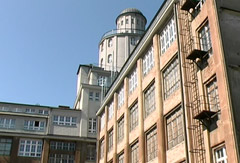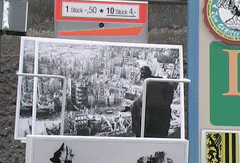

Inspired by the films of Chris Marker, this video essay examines the sometimes surprising links between photography, architecture, and ideology in the formation of the urban identity of Dresden. An unnamed narrator is asked to carry out research on the socio-spatial situation in this city, which was recently embroiled in controversy over a new construction project (Unesco is threatening to withdraw its World Heritage status). The film goes on to deconstruct the city’s continued orientation around an idealized and unattainable image from its past, despite its dramatic historic transformations. The narrator uncovers this complex history using images from various time periods that reveal the city’s conflicting ideological relationships. This was a city that embraced the phantasmagoria of modernity at the turn of 20th Century. And yet, the recurring nostalgia for an eternal Baroque city is revealed even in the legacy of National Socialism; after the destruction of WWII and its reconstruction as an East German manufacturing centre; and finally in urban strategies as an outpost of advanced capitalism intent on constructing an empty simulacra of its previous beauty.
The complex connections between image, ideology and space that the reluctant yet highly articulate narrator establishes during his many tours through the contemporary city give this film an engaging and thought-provoking tone. Early on we see the telescopic tower of the Ernemann Camera Factory, later Zeiss Icon, that is more sign than architecture, establishing a vivid link between surveillance, imaging and urban space. Later, the narrator identifies the hidden politics of ‘Silicon Saxony’ in relation to the hi-tech processing of images. These and other stories provide an illuminating portrait of the city, with meticulous observation and research, provocative and subjective insight, and a melancholic yet passionate call for architecture based in the commonalities of a collective society rather than the illusions of capitalist exchange.